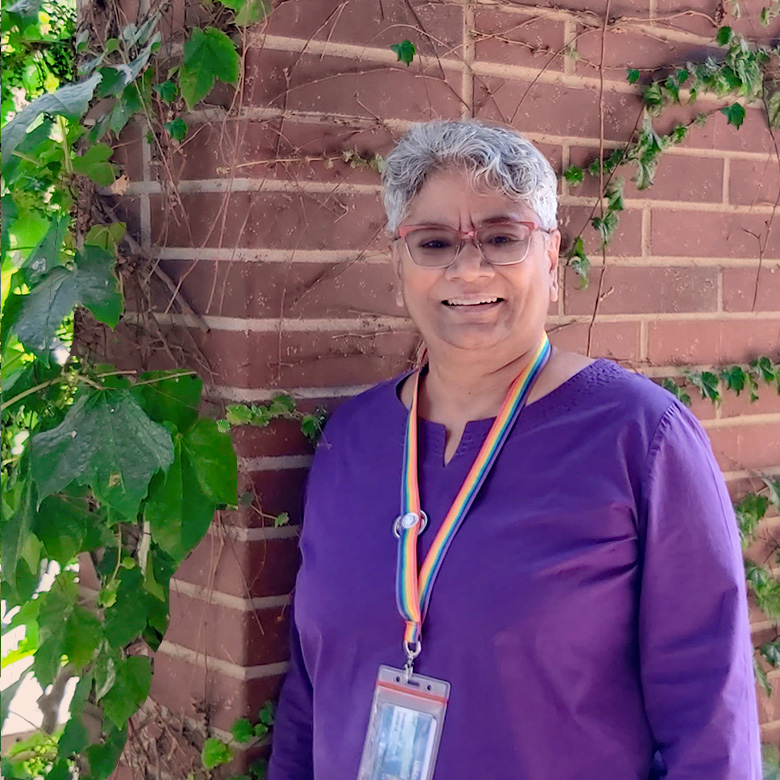The courage to think differently
Inspired by her years as a leader in the non-profit sector, Dharshi Lacey encourages students, faculty and staff to push themselves beyond their comfort zone to advance equity.
Dharshi Lacey’s journey to becoming a leader in equity, diversity and inclusion began unintentionally after she immigrated from Sri Lanka to Canada in 1985. Equipped with a degree in business and economics and a wide array of experience in the finance sector, Lacey began looking for work, intending to continue her career in her new country. But despite her experience and education, she wasn’t able to find work in her field.
“I was caught in a very quintessential immigrant experience, where I couldn’t find a job because I didn’t have work experience in the country, but I wasn’t offered any opportunities to get work experience.”
Ultimately, Lacey found work connected directly to this experience, joining a non-profit organization with a mission to help immigrant women re-enter the workforce, using her background in finance to teach bookkeeping skills. “Working with so many highly skilled people from historically marginalized groups who couldn’t find work got me in the mindset of seeing and appreciating the inequities. That’s when the seed was planted.”
Lacey continued to nurture and grow that seed over her 20-year career in the non-profit sector, where she worked to champion equity and inclusion at a program and systems level. Her experience includes employment services, youth mental health, community health and cross-sectoral work within non-profit leadership and governance. This work provided her with the opportunity to see the changing landscape of equity over the years. “It hasn’t happened quickly, but we’ve definitely changed as a society in the last few years,” Lacey shares. “Ten years ago, I was told not to use the word anti-racism because nobody would come to my workshops. Now I can call it anti-racism and decolonization, and people will come.”
“Equity isn’t about checking a box or reaching a goal post— it’s an ongoing process of being in learning,”
But that isn’t to say it’s come easy or there hasn’t been resistance. While there’s an increased appetite for anti-racism work, Lacey notes that the reality of engaging in equity work is much more complicated than some realize. “Equity isn’t about checking a box or reaching a goal post— it’s an ongoing process of being in learning,” she explains. “Leaders need to understand that entering the space of equity means they’re acknowledging that in five or ten years, the systems they’re part of are going to look different. For me, that understanding is magic.”
“People can feel uncomfortable in equity work because we are asking them to think differently,” says Lacey. “When people push themselves a little bit further than they were willing to go at first, that’s when we start to see change.”
Now joining UBC Okanagan as the Director, Inclusion, Equity, Diversity and Anti-Racism, Lacey is excited to see how systems at UBC might look different in a few years as the Equity and Inclusion Office (EIO) focuses their efforts to bring UBC’s commitments to equity and anti-racism—outlined in the Strategic Equity and Anti-racism Framework and Roadmap to Change—to life. “There’s a lot of great work happening around equity work across campus by individuals, Faculties and administration, but we also need to think about how we are working together collectively to move the needle forward,” she says. “Part of my responsibility is to make sure this stays as deep work and does not become performative. I’d like us to be able to look back in 10 years and be able to see all the shifts we have made in the tangible and intangible ways equity is embedded in the university and how it moves forward.”
Lacey sees seeds of change already taking root, with new investments being made in people and systems to support an equitable future in academia and beyond. “This is an important moment in time—people are reaching out and wanting to know more,” she says. “With each passing generation, we’re starting further ahead, and hopefully in the future, we won’t even recognize the inequities in society we left behind.”
Anyone seeking support with advancing equity and anti-racism can get in touch with Dharshi directly or by submitting a request for a consultation with the EIO team.

